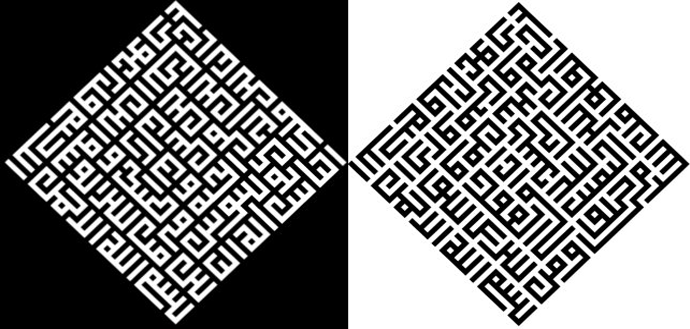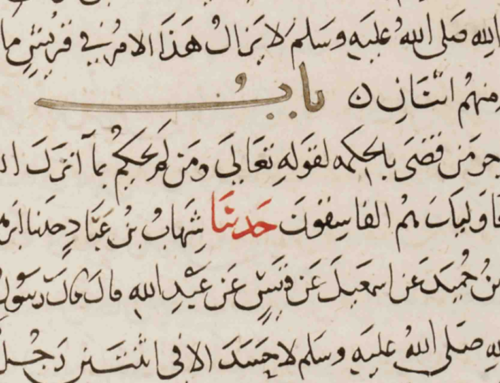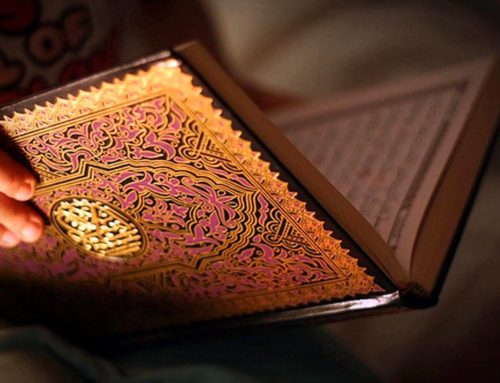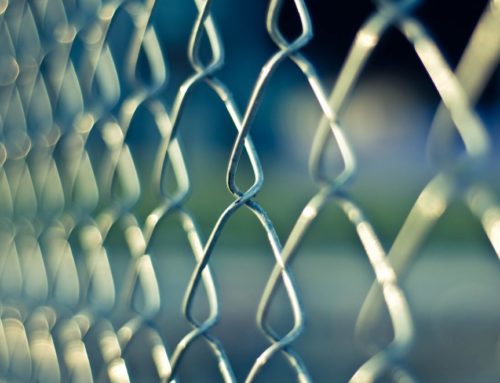Translated by Zameelur Rahman
Surayj ibn Yunus and Yahya ibn Ayyub narrated to me: they said: ‘Abbad ibn ‘Abbas narrated to me from Hisham ibn ‘Urwah: from his father: from ‘A’ishah (Allah be pleased with her): she said:
“When one of his family was sick, Allah’s Messenger (Allah bless him and grant him peace) would blow over him upon [reciting] mu’awwidhat [1]Surah al-Falaq and Surah al-Nas. When he became sick with the illness in which he died, I began blowing on him and I wiped him with his own hands, because that was greater in blessing than my hands.” In the narration of Yahya ibn Ayyub it adds, “while [reciting] the mu’awwidhat.” (Sahih Muslim)
The hadith proves the permissibility of ruqyah and blowing [nafth] after it. We have set forth beforehand in the early chapters of Kitab al-Tibb that its permissibility is preconditioned on it being understood, not containing istimdad with other than Allah (Most High) and not believing that it has efficacy in itself, and whoever meets these conditions, there is no harm in his ruqyah.
Writing Ta’widhat
Moreover, the starting point in the issue of ruqyah is that it is done by reciting the Noble Qur’an or some of the names of Allah Most High or His attributes, and thereupon to blow on the sick. This has been established from the Prophet (Allah bless him and grant him peace) in a number of hadiths. As regards to writing ruqyahs, hanging them on the neck of children and the sick, or writing them and giving its ink to the sick to drink, this has been established from a number of Companions and Successors.
Ibn Abi Shaybah transmitted in his Musannaf (8:39) from ‘Amr ibn Shu’ayb from his father: from his grandfather: he said: Allah’s Messenger (Allah bless him and grant him peace) said, “When one of you becomes fearful in his sleep he should say: ‘In Allah’s name, I seek refuge with the complete words of Allah from His anger and His punishment and the evil of His slaves, and from the evil suggestions of the shaytans and from their being present [at death].'”
‘Abdullah, i.e. Ibn ‘Amr, would teach these words to children, whoever of them could remember it, and whoever could not remember, he would write it and hang it around his neck.
Ibn Abi Shaybah also transmitted from Abu ‘Ismah: he said, “I asked Sa’id ibn al-Musayyab about ta’widh and he said: ‘there is no harm when it is on leather.'”
And he transmitted from ‘Ata that he said about a menstruating woman who had a ta’widh on her: “If it is leather she should take it off and if it is on a silver thread, if she wishes she may put it on and if she wishes she need not put it on.”
And he transmitted from Mujahid that he would write ta’widh for people and hang it on them.
And he transmitted from Abu Ja’far, Muhammad ibn Sirin, ‘Ubaydullah ibn ‘Abdullah ibn ‘Umar and al-Dahhak proof that they would permit writing ta’widh and hanging it or tying it around the upper arm, etc.
Al-Hafiz Ibn Taymiyyah said in his Fatawa (19:64): “It is permissible to write for the one afflicted [with the evil eye] and others of the sick something from the Book of Allah and His dhikr with permissible ink, and wash [the ink off the paper] and give it to drink, as Ahmad and others have explicated. ‘Abdullah ibn Ahmad said: ‘I read unto my father: Ya’la ibn ‘Ubayd narrated to us: Sufyan narrated to us: from Muhammad ibn Abi Layla: from al-Hakam: from Sa’id ibn Jubayr: from Ibn ‘Abbas (Allah be pleased with him): he said: When labour becomes difficult for a woman one should write: ‘In Allah’s name, there is no god but Allah, the Clement the Honourable. Glory to Allah Lord of the Magnificent Throne. All praise to Allah Lord of the Worlds. On the day when they behold it, it will be as if they had but tarried for an evening or the morn thereof (79:46), On the day when they behold what they were promised, it will be as if they had but tarried for an hour of a day, A clear message. Shall any be destroyed save evil-living folk? (46:35)’
“My father said: ‘Aswad ibn ‘Amir narrated to us with his chain [of narration] the same thing and he said: one writes [the ta’widh] in a clean vessel and gives it to drink’. My father said: ‘and Waki’ added in his narration: she is given to drink [from it] and it is sprinkled below her navel. ‘Abdullah said: I saw my father writing [a ta’widh] for a woman on a cup or something clean.'”
Ibn Taymiyyah (Allah have mercy on him) then transmitted this narration of Ibn ‘Abbas through another route, and he said at the end of it: “‘Ali (meaning Ibn al-Hasan, the nephew of the narrator of this narration) said: ‘one writes [the ta’widh] on paper and ties it around the upper arm of a woman’. ‘Ali said: ‘indeed we tried this and did not see anything more remarkable than it. When she delivered, it was quickly disposed of, by subsequently shredding it or burning it.'”
These narrations contain proof against those in our time who claim that writing ta’widh and giving them to drink or hanging them [around one’s neck] is prohibited according to the Shari’ah, and indeed some of them greatly exaggerated until they claimed it to be shirk.
They adduce as proof what Abu Dawud transmitted (no. 3883) from Zaynab the wife of ‘Abdullah: from ‘Abdullah ibn Mas’ud (Allah be pleased with him): he said: “I heard Allah’s Messenger (Allah bless him and grant him peace) say: ‘Indeed ruqyahs (incantations), tama’im (amulets) and tawlah (potions) are shirk.'”
However, the complete [wording] of this hadith contains what would refute this line of reasoning, for it mentions: Zaynab said: “I asked: Why do you say this? By Allah, when my eye was discharging I used to visit a certain Jew who applied a ruqyah on me. When he applied the ruqyah on me, it calmed down.” ‘Abdullah said: “Indeed that is but the work of shaytan, he picked the eye with his hand, and when the Jew applied the ruqyah, he desisted. It is enough for you to say as Allah’s Messenger (Allah bless him and grant him peace) would say: ‘Remove the harm, Lord of men and heal. Thou art the Healer. There is no remedy but Thine which leaves no disease behind.'”
This hadith clearly proves that the ruqyah that is prohibited in the hadith is only the ruqyah of the people of shirk who would seek help from the shaytans and others. As regards to ruqyah in which there is no shirk, it is permissible and is established from the Prophet (Allah bless him and grant him peace) in numerous hadiths. The same is the case with tama’im, which is the plural of tamimah, and these were stones the Arabs would hang on their children, believing that they have efficacy in themselves. Al-Shawkani said while commenting on the hadith of Abu Dawud in Nayl al-Awtar (8:177): “He included these three in [acts of] shirk due to their belief that they have efficacy in themselves.”
Ibn ‘Abidin said in Radd al-Muhtar (6:363): “In al-Shalbi [it is narrated from] from Ibn al-Athir: tama’im is the plural of tamimah, and they are stones which the Arabs would hang on their children to protect them from the evil eye in [accordance] with their belief, so Islam abolished it … because they believed that it is the complete treatment and cure, rather they made it an associate [with Allah], because they intended thereby to repel the destinies written for them and sought from other than Allah Most High to repel harm while He [alone] repels [harm].”
By this it becomes evident that the tama’im that are prohibited have no relation to ta’widhs that are written containing verses of the Qur’an or some form of dhikr, since that is permissible according to the majority of the jurists of the Ummah. Rather some ‘ulama have recommended them when they are done using the transmitted dhikrs (al-adhkar al-ma’thurah), as al-Shawkani transmitted from them in al-Nayl. And Allah knows best.
Takmilah Fath al-Mulhim, Vol 4 pp. 276-8
| ↑1 | Surah al-Falaq and Surah al-Nas |
|---|






